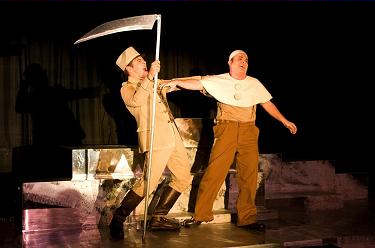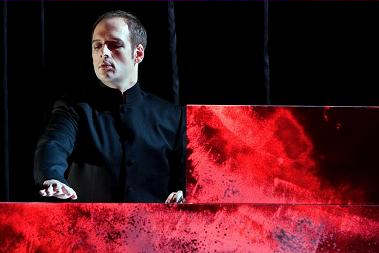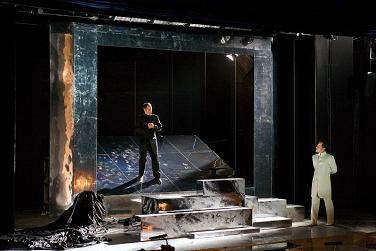Other Links
Editorial Board
- Editor - Bill Kenny
- London Editor-Melanie Eskenazi
- Founder - Len Mullenger
Google Site Search
SEEN
AND HEARD INTERNATIONAL OPERA REVIEW
Ullmann,
Der Kaiser von Atlantis:
at
Jüdisches
Kulturzentrum in collaboration with the Bavarian State Opera:
Soloists, Orchester
Jakobsplatz München, Daniel Grossmann (conductor) Hubert-Burda
Saal, Munich 16.11.2007 (JFL)
The short one act opera “The Emperor of Atlantis” (also known as
“Death Resigns” or “Death’s Refusal”) was created with librettist
Peter Kien in the Winter of 1943/44 for seven characters or
“Archetypes” and a small orchestra. Rehearsals faltered when too
many of the participants were either shipped off elsewhere or
became sick in early 1944. Later that year, the camp inmates
managed to put together a dress rehearsal, after all. Not
surprisingly to anyone who has seen or heard the opera, the
efforts to avoid censorship through abstraction and symbolism in
the opera could not have fooled even the densest SS Guard. With
blatant references to Hitler via “The Emperor” a.k.a. “Supreme
General” – more than just a hint at “GröFaZ”
[1] – the opera was deemed unacceptable, was
banned, and never premiered. Only shortly thereafter – related to
the production or not – the collaborators on this opera were
shipped off to Auschwitz. The opera only survived because Viktor
Ullmann handed the score to a fellow inmate at Terezín, Emil Utitz,
whose fate was more fortunate.
The Orchestra Jakobsplatz
München, formed by young musicians of the Jewish
community of Munich and beyond, performed this infrequently heard
(though hardly neglected) work at the opening of the city's 21st
Festival of Jewish Culture. This was the third collaboration
between the Orchestra and Bavarian State Opera (after Philip
Glass’s “The Fall of the House of Usher” in 2005 and Vivaldis’ “Juditha
Triumphans” in 2006). And the involvement of one of the
largest and most professional opera houses certainly showed! I
would not be surprised if, in turning the Jewish Community
Center’s auditorium into a little opera house, twice as many
technicians, artists, and stage hands than musicians were
involved. (Markus Koch, direction; Iris Jedamski, stage; Michael
Bauer, lighting.)
Since the State Opera also lent its singers to the effort, the
vocal contributions were extraordinary and perhaps most
noteworthy with Christian Miedl’s
Emperor and Kevin
Conners’ Harlequin.
But no matter the amount of effort involves, there is no way
of course, to perform this opera with even the slightest degree of
‘authenticity’ – an authenticity that would not only demand the
recreation of the ghastly and dire circumstances but also the
execution of a random 80 percent of audience and musicians after
the performance. If ever there was a good argument against “Period
Performances”.....
Production Team
Markus Koch (direction)
Iris Jedamski (sets)
Claudia Gall (costumes)
Michael Bauer (lighting)
Cast
Christian Miedl (Kaiser Überall)
Andreas Kohn (Speaker)
Adrian Sâmpetrean (Death)
Kevin Conners (Harlekin)
Michael McBride (Soldier)
Elif Aytekin (Girl)
Stephanie Hampl (Drummer)

Andreas Kohn : The Speaker

Adrian Sâmpetrean (Death) :
Kevin Conners (Harlekin)

Christian Miedl: Kaiser Überall

Christian Miedl (Kaiser Überall):Adrian Sâmpetrean (Death)
Viktor Ullmann’s life and work has been rescued from near total
obscurity to relative prominence by this opera. Performances of it
have increased appreciably since 1994 when Schott Publishing
decided to make it available in print. There are two recordings of
it now: Decca’s 1993 ‘luxurious’ version with a fine cast
and full-size orchestra, part of the discontinued but sporadically
reissued “Entartete Musik” edition, and a 1995 Czech release with
a small orchestra (as indicated in the score) on
STUDIO MATOUŠ MK. James Conlon has long championed it
too, and further contributed to the Ullmann audience with the DVD
“Estranged Passengers - In Search Of Viktor Ullmann” (The title is
taken from
But just as the opera cannot be performed in an even remotely
‘authentic’ way, it cannot be separated from its history, either.
Viewed and heard in isolation, it would merely be a strange opera,
pleasantly short at under 50 minutes, influenced by Revue and Jazz
(reminiscent of “Johnny
Spielt Auf”)
and veering between the lyrical, the alienating, and the ugly.
Emperor “Űberall” (invariably translated [?] as “Emperor Overall”
– although that’s too literal; “Emperor Everywhere” is more apt,
as would be “Emperor Above All”, or “Emperor Omnipresent”)
-cruelly rules, fighting a war of “all against all”. Death,
feeling forcibly co-opted into the Emperor’s schemes, decides to
go on strike. As a result, people can still get shot, mutilated,
and torn apart, but they can no longer die. The Emperor tries to
use this to his advantage, promising his soldiers eternal life.
But even with the aid of his propaganda tool “The Drummer” ,
(the beautifully acting and singing Stephanie Hampl here), he
cannot prevent more and more rebellions from springing up in
response to the misery and suffering caused by the absence of
death. The Emperor despairs and in a delirium he sees the figure
of Death himself.
Death promises to resume his duties as long as the Emperor is
willing to be the first to meet the “new” Death. Eventually the
Emperor agrees – but not without prophesizing that his fall will
hardly mean the end to violence. A chorale (a warped “A Mighty
Fortress is our God”) praises Death as giving value to life and
ends the opera. A “Speaker” (an imposing Andreas Kohn) announces
the action and participants before the opera and serves as the
communication manager for the Emperor. Harlequin (looking rather
more like Pierrot in Claudia Gall’s costume) is a stand in for
life and serves as a constant reminder of hope. A young soldier
and a female colleague from the opposing army provide a romantic
subplot in the third scene. They were sung here by Michael McBride
and Elif Aytekin who, if equipped with a more natural German,
could have done more with the spoken elements, the same of which
goes for Adrian Sâmpetrean’s otherwise striking Death.
The orchestra, led by their young and engaging founder Daniel
Grossmann, who displays a charmingly nervous confidence, did as
well as might have been expected, playing the music - which offers
few ‘thankful’ parts to show off with anyway - in a perfectly
capable manner. As the Decca recording shows, a souped-up
professional and polished orchestra can make the music sound much
better, but whether that is desirable during a live
performance which wishes to touch upon the spirit of the opera and
perhaps also the occasion of its composition and first rehearsals,
is questionable.
“Der Kaiser von Atlantis” – beyond being embraced as exciting due
to its history – remains a troublesome work which is
difficult in every way, to come to terms with. And perhaps that’s
precisely the message that an opera like this, born under the
circumstances it was, should send to us and remind us
of. In that sense, the efforts of the Staatsoper, the
Society for the Advancement of Jewish Culture and Tradition, and
the Jakobsplatz Orchestra were well expended.
Jens F Laurson
All pictures © Wilfried Hösl, published with kind permission of the Staatsoper München.
Depicting, from top to bottom, Andreas Kohn (A Speaker), Adrian Sampetrean (Death) and Kevin Conners (Harlequin), Christian Miedl (Emperor), Sampetrean and Miedl.
[1] The German mocking acronym for “Greatest General of all Times” denoting Hitler and ridiculing the Nazi’s penchant for acronyms – while the title itself, coined by General Fieldmarshall Wilhelm Keitel, was ‘bestowed’ upon Hitler in all seriousness.
